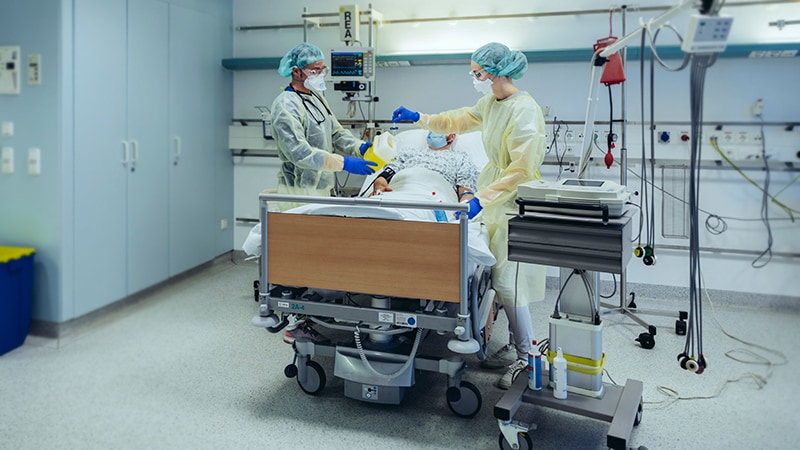
Editor’s note: Discover the most recent COVID-19 news and assistance in Medscape’s Coronavirus Resource Center
.

Dr Valerie M. Vaughn
Prophylactic anticoagulation to avoid venous thromboembolism(VTE) was related to decreased 60- day death in clients with COVID-19 who were ill adequate to need hospitalization, a brand-new report programs.
In a mate research study of more than 1300 hospitalized clients with COVID-19 infection throughout 30 health centers in Michigan, both prophylactic- and therapeutic-dose anticoagulation were connected with minimized in-hospital death; nevertheless, at 60 days, just prophylactic-dose anticoagulation stayed related to lower death.
And adherence was crucial; nonadherence, or missing out on 2 days or more of anticoagulation, was connected to more deaths at 60 days.
The findings, which were released online June 11 in JAMA Network Open, is last evidence that a prophylactic anticoagulation technique for the hospitalized COVID population is, undoubtedly, the ideal one, Valerie M. Vaughn, MD, director of healthcare facility medication research study at the University of Utah, Salt Lake City, informed theheart.org|Medscape Cardiology
” We have actually most likely constantly understood that clients with COVID require prophylaxis for VTE however we discovered that at an early stage, regrettably, that wasn’t being done,” Vaughn stated.
” Now, we see that prophylactic rates have actually increased. We constantly understood to utilize anticoagulation prophylactically in clients who were hospitalized with infection since of their danger for VTE, so this research study simply drives house that correct adherence to an anticoagulation procedure enhances death,” she stated.
Vaughn was on the cutting edge when COVID-19 pertained to Michigan, where the research study was performed.
” We most likely ought to have been anticoagulating from the beginning, however you need to bear in mind that in the early days of COVID, the medical facilities in Michigan were being overwhelmed. They didn’t have PPE. They were looking after clients beyond their common healthcare facility beds or establishing field healthcare facilities,” she stated. “It was not rather as bad as New york city, however at the University of Michigan, we established 4 or 5 ICUs beyond our typical care.”
They likewise transformed the leading flooring of their pediatric medical facility into an ICU to look after clients with COVID throughout the very first rise, she included. “We didn’t understand much about this illness, however confronted with this increase of clients, a number of whom were passing away with embolism, we needed to do something.”
Some medical facilities started prophylactically anticoagulating their clients, however others was reluctant prior to embracing the technique. “Now we feel great that prophylactic anticoagulation, done according to the best procedure, without any disruptions in the treatment, is helpful,” Vaughn stated.
The very best medication option is enoxaparin(Lovenox), which can be offered as soon as a day, rather than heparin, which requires to be provided by means of injection 3 times a day, she stated.
” Prophylactic dosage anticoagulation is normally provided by an injection under the skin, however a great deal of times, I have actually had clients inform me they seem like a human pin cushion and have all these swellings from being stuck to needles every day, which I can completely associate with,” she stated.
” It is necessary for us as clinicians to discuss that we’re needing to poke our clients due to the fact that it benefits them and will assist them combat COVID,” she included. “Likewise having the once-a-day alternative is going to be a lot much better for adherence, and adherence to the procedure, not missing out on any days, is crucial to the much better result.”
Vaughn and her group examined the charts of 1351 clients (48%ladies, 49%Black, average age 64 [range 52-75]) who were hospitalized throughout Michigan throughout the very first a number of months of the COVID-19 pandemic, from March to June 2020.
Just 18 clients (1.3%) had actually a verified VTE and 219 clients (162%) got treatment-dose anticoagulation.
The scientists kept in mind that usage of treatment-dose anticoagulation without imaging varied from 0%to 29%throughout medical facilities and increased considerably in time.
Of the 1127 clients who got anticoagulation, 392 (348%) missed out on 2 days or more of prophylaxis.
In addition, there were differing rates of missed out on prophylaxis amongst the health centers, from 11%to 61%, however these rates reduced considerably with time.
Missed out on dosages were connected with a greater 60- day death (changed threat ratio [aHR], 1.31; 95%CI, 1.03 -1.67), however not in-hospital death (aHR, 0.97; 95%CI, 0.91 -1.03).
Compared to no anticoagulation, getting any dosage of anticoagulation was related to lower in-hospital death.
Nevertheless, just prophylactic-dose anticoagulation stayed connected with lower death at 60 days. The adjusted threat ratio for prophylactic-dose anticoagulation was 0.71(95%CI, 0.51 -0.90), compared to 0.92(95%CI, 0.63 -1.35) for treatment-dose anticoagulation.
Research Study Increases Self-confidence
.

Dr Andrew B. Dicks
Regardless of its constraints, the research study must make clinicians more positive that making use of prophylactic anticoagulation is required for hospitalized clients with COVID-19, compose Andrew B. Dicks, MD, and Ido Weinberg, MD, from Massachusetts General Healthcare Facility, Boston, in an welcomed commentary.
.
” Almost, we still do not have the granular information we require to assist us in patient-by-patient decision-making– such as anticoagulation representative option, dose, and period of treatment– particularly as determined by skill of client disease,” Dicks and Weinberg note.
” While we still wait for the information from randomized regulated trials to assist the optimum anticoagulation dosage and period, this research study includes considerable benefit to the formerly released suggestions from numerous various medical companies concerning using prophylactic anticoagulation in hospitalized clients with COVID-19,” Dicks informed theheart.org|Medscape Cardiology
The research study was supported by Blue Cross and Blue Guard of Michigan and Blue Care Network as part of their Worth Collaborations program. Vaughn has actually reported getting speaking charges from Thermo Fisher Scientific. Cock and Weinberg have actually reported no pertinent monetary relationships.
JAMA Netw Open. Released online June 11,2021 Complete text, Commentary
.
Follow Medscape on Facebook, Twitter, Instagram, and YouTube
.
No comments:
Post a Comment